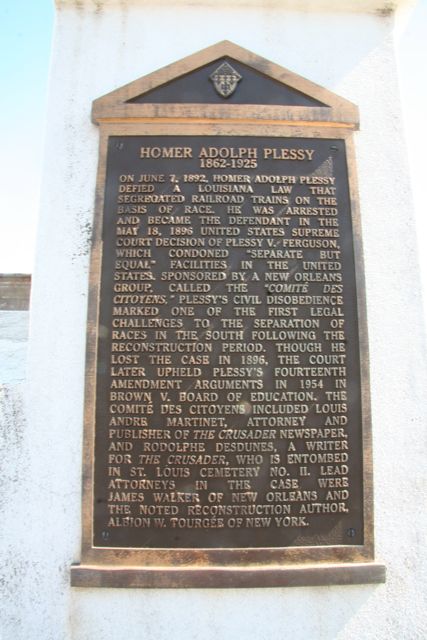Civil Rights pioneer fights the system – and loses!
On June 7, 1892, Homer Plessy was arrested for sitting in the wrong car on a Louisiana train. He was charged with a violation of the 1890 Separate Car Act, which required all trains in Louisiana to have “whites only” and “blacks only” trains. Plessy would take his case all the way to the United States Supreme Court.
Homer Plessy was a mixed-race man born free in New Orleans, Louisiana. As civil rights deteriorated after the Reconstruction Era ended, several groups were created to fight the so-called Jim Crow laws. The civil rights group Committee of Citizens recruited Plessy to be a legal test case to fight the law. The Committee for Citizens recruited a private detective and gained the cooperation of the East Louisiana Railroad to agree to press charges. (Many railroads opposed the law because it raised operating costs.)
On June 7, 1892, Homer Plessy purchased a first-class ticket and boarded the train. The conductor collecting the tickets advised Plessy to leave the car and move to the “blacks only” car. Plessy refused to leave and waited patiently for his pre-arranged arrest by the private detective. He was brought to court and arraigned for the violation of the Sperate Car Act. Plessy was arraigned and released after the Committee for Citizens paid his $500 bond (an estimated $18,000 today – talk about a need for bail reform!)
In his first trial Plessy submitted a petition to the court that argued that the Separate Car Act violated the 13th and 14th Amendments. Judge John Howard Ferguson denied the petition, and Plessy’s attorneys appealed to the Louisiana State Supreme Court. That court also denied the petition and sided with the local court.
Plessy’s lawyers then made an appeal to the United States Supreme Court which agreed to hear the case. The case was called Plessy v Ferguson based on the name of the judge who initially denied the petition to overturn the bad law. On May 18, 1896, the Supreme Court issued a 7–1 decision against Plessy that upheld the constitutionality of Louisiana’s train car segregation laws. The trial was sent back to the local Louisiana Court where Plessy was found guilty and paid a $25 fine.
The Plessy decision would remain case law until the Supreme Court decision in Brown v. Board of Education overturned the doctrine in 1954.
Thanks for reading The Ops Desk!











